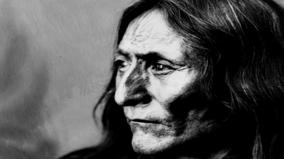Poundmaker's Lodge: A Healing Place
Just north of the City of Edmonton lies Poundmaker’s Lodge, an addiction and mental-health facility specializing in treatment for Indigenous people. Founded in 1973 and still operational today, the Lodge’s programs and services are Indigenous-run and based in culturally appropriate recovery and healing techniques. Framing the short documentary with the words of the great Plains Cree Chief Pîhtokahanapiwiyin (Poundmaker), Alanis Obomsawin presents a frank examination of the root causes of substance abuse in Indigenous communities and how the absence of love and support – exacerbated by the impacts of colonialism and racism – created a legacy of alcoholism for some …

Details
Just north of the City of Edmonton lies Poundmaker’s Lodge, an addiction and mental-health facility specializing in treatment for Indigenous people. Founded in 1973 and still operational today, the Lodge’s programs and services are Indigenous-run and based in culturally appropriate recovery and healing techniques. Framing the short documentary with the words of the great Plains Cree Chief Pîhtokahanapiwiyin (Poundmaker), Alanis Obomsawin presents a frank examination of the root causes of substance abuse in Indigenous communities and how the absence of love and support – exacerbated by the impacts of colonialism and racism – created a legacy of alcoholism for some individuals.
-
writerAlanis Obomsawin
-
directorAlanis Obomsawin
-
editorRita Roy
-
voiceBrian Eyahpaise
-
cameraRoger Rochat
-
additional photographyDoug Cole
-
assistant cameraMichel Bissonnette
-
location soundRaymond Marcoux
-
song - writerShannon Two Feathers
-
song performerShannon Two Feathers
-
principal fluteDario Domingues
-
additional musicLuc-Dominique TremblayWilliam ButlerGordon TootoosisSarain Stump
-
participantRoy ThomasRon NabigonOlivine WoodRachelle SeguinBrian RoastingJonathan Minde
-
sound editorPaul Demers
-
assistant sound editorJean-Pierre Viau
-
voice recordingChristian Fortin
-
music editorJulian Olson
-
re-recordingJean-Pierre Joutel
-
animation cameraPierre Landry
-
title designLouise Overy
-
optical layoutSusan Gourley
-
studio administratorMarie Tonto-Donati
-
post-production coordinatorGrace Avrith
-
production coordinatorAndrée Lachapelle
-
executive producerAndy Thomson
-
researchAlanis Obomsawin
-
producerAlanis ObomsawinMarrin CanellRobert Verrall
Education
Ages 16 to 18
Health/Personal Development - Mental Health/Stress/Suicide
Health/Personal Development - Substance Use and Abuse/Addiction
Indigenous Studies - History/Politics
Indigenous Studies - Identity/Society
Indigenous Studies - Issues and Contemporary Challenges
Warning: Topics include suicide, addiction (alcoholism, narcotics), murder. This documentary can inspire research, discussion, projects and deeper learning about social implications of First Nations, Inuit and Métis peoples. How has the Indian Act and other policies and laws forced upon First Nations, Inuit and Métis peoples contributed to negative social implications that some have faced and continue to face? How did the forced severing of original ways of childrearing rooted in First Nations, Inuit or Métis peoples’ ways fracture families? What are examples of original or traditional methods of childrearing? Who was Chief Pîtikwahanapiwiyin (Poundmaker) and what is his legacy? How do healing lodges support a more just and healthy society? How do negative beliefs about First Nations, Inuit and Métis peoples continue to shape Canadian society and what can be done to dismantle the racism and hate projected upon First Nations, Inuit and Métis peoples? What are root causes of substance abuse within the context of this film? How has colonialism and racism created a legacy of trauma for some individuals and communities? How does social programming contribute to prevention while encouraging health and wellness on an individual and social level?

















